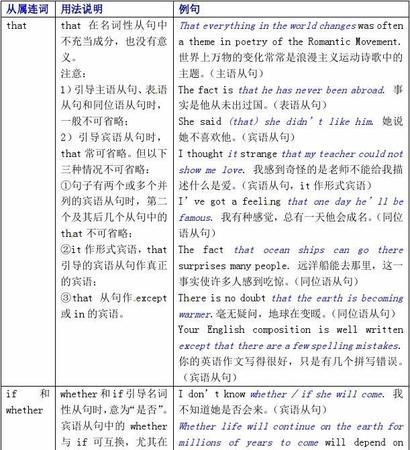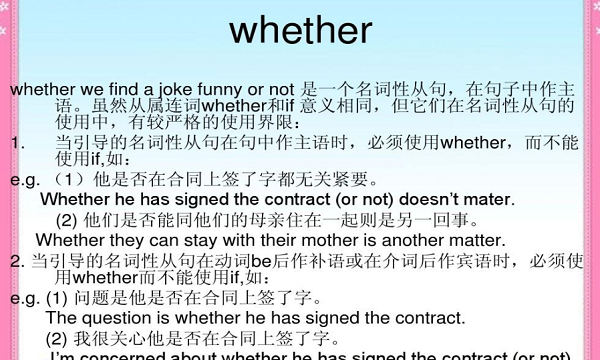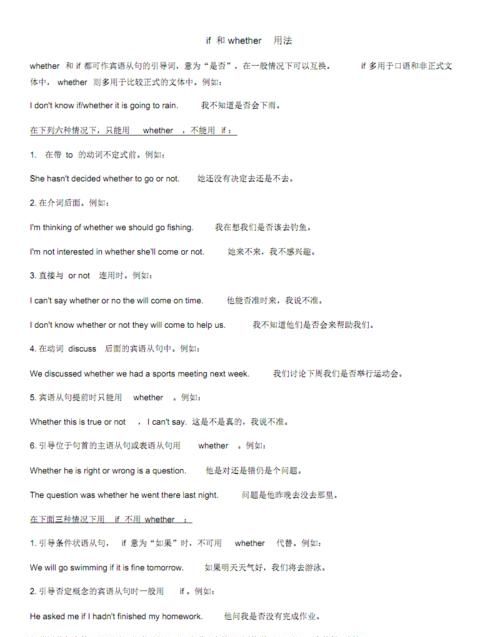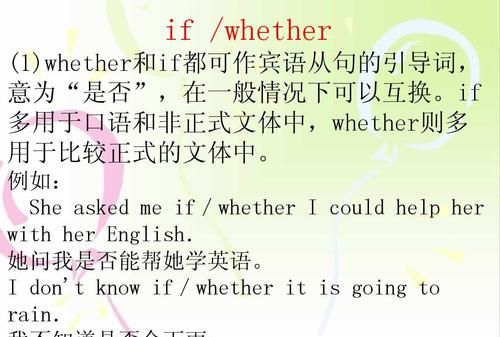本文目录
宾语从句if 和whether的用法区别
if与whether的用法区别
两者在表示“是否”时的用法区别如下:
1.
互换的场合
引导宾语从句表示“是否”时,
两者常可互换。如:
He
asked
if
[whether]
we
wanted
a
drink.
他问我们是否想喝一杯。
He
didn’t
tell
me
if
[whether]
he
would
come.
他没有告诉我他是否会来。
注:若是引导条件状语从句,则只能用
if
(意为“如果”)。
2.
通常用
if
的场合
当引导一个否定的宾语从句时,通常用
if
而不用
whether。如:
I
don’t
care
if
it
doesn’t
rain.
我不在乎天是否下雨。
注:在个别词语
(如
wonder,
not
sure
等)后的从句否定式有时也可能用
whether
来引导。如:
I
wonder
if
[whether]
he
isn’t
mistaken.
我想知道他是否错了。
3.
通常用
whether
的场合
(1)
引导主语从句且放在句首时。如:
Whether
he
will
come
is
still
a
question.
他是否会来还是个问题。
注:若在句首使用形式主语
it,而将主语从句放在句末,则有时也可用
if
来引导。如:
It
was
not
known
whether
[if]
he
would
come.
不知他是否会来。
(2)
引导表语从句时。如:
The
question
is
whether
we
should
go
on
with
the
work.
问题是我们是否应该继续进行这项工作。
注:引导表语从句偶尔也用
if
(很不正式),但远不如用
whether
常见。
(3)
引导宾语从句且放在句首时。如:
Whether
he
is
single
I
don’t
know.
他是否单身,我不知道。
(4)
引导让步状语从句时。如:
Whether
he
agrees
or
not,
I
shall
do
that.
不管他同意与否,我都要那样做。
(5)
与
or
连用分别引导两个从句时。如:
I
don’t
know
whether
he
is
wrong
or
she
is
wrong.
我不知道是他错了,还是她错了。
注:or
若不是引导两个从句,而是连接两个词或短语,则也可用
if
(但不如用
whether
常见)。如:
He
didn’t
know
if
[whether]
we
should
write
or
phone.
他不知道我们是写信好还是打电话好。
(6)
用于不定式之前时。如:
I’m
not
sure
whether
to
stay
or
leave.
我不知是留还是去。
I
didn’t
know
whether
to
laugh
or
to
cry.
我真是哭笑不得。
(7)
用于介词之后时。如:
It
depends
on
whether
the
letter
arrives
in
time.
这取决于信是否来得及时。
I
worry
about
whether
I
hurt
her
feelings.
我担心是否伤了她的感情。
(8)
直接与
or
not
连用时。如:
I
will
write
to
you
whether
or
not
I
can
come.
我能不能来,我将写信告诉你。
注:若不是直接与
or
not
用在一起,则有时也可用
if。如:
I
don’t
know
whether
[if]
he
will
win
or
not.
我不知他是否能赢。
(9)
在某些动词后(如
discuss
等)
通常只用
whether。如:
We
discussed
whether
we
should
hold
a
meeting.
我们讨论了是否要开一个会。

if和whether的用法区别
一、引导宾语从句,一般既可用whether也可用if。但 1. or not放在whether之后时,只能用whether不用if。 I don’t know whether or not he will come. 我不知道他是不是回来。 注1:如果or not放在whether所引导的从句句尾,则可以用if来替换。 I don’t know whether/if he will come or not.我不知道他是不是回来。 2. 在强调任意选择时,用whether…or,此时不用if替换whether。 He asked me whether I wanted to go there by train or by bus.他问我是想乘火车还是坐公共汽车去那里。 注:whether和or一起还有“不管”之意,引导让步状语从句。 Whether he drives or takes the train, he will be here on time.不管开车来还是乘火车来,他都会准时到。 3. 虽引导宾语从句,但为了强调宾语部分,也可把从句放在句首,此时只用whether不用if。 Whether he will come I am not sure.他是不是来我拿不准。 4. 从句作介词宾语时只用whether不用if。 It depends on whether it will be fine.那得看是不是晴天。 5. 作discuss等动词的宾语时,用whether不用if。 We discussed whether we should close the shop.我们讨论是不是该关掉商店。 6. 句子中有if引导的条件句,如再有表示“是否”的宾语从句,用whether不用if。 He asked me whether I’d move to New York if I got the job.他问我如果我得到那份工作是否会搬家到纽约。 7. 容易产生歧义时用whether不用if来表示“是否”。 Please let me know if you need help. 如果你需要帮助请告诉我。或:请告诉我你是否需要帮助。对比:Please let me know whether you need help.请告诉我你是否需要帮助。 8. 如果宾语从句为否定句时,则只用if不用whether。 I don’t know if it won't rain tomorrow..我不知道明天是不是会下雨。 二、在引导主语从句、表语从句、同位语从句时一般用whether不用if。如: ⑴ Whether it is true remains a question.(主语从句)那是不是真的还是个问题。 ⑵ The question is whether it is true.(表语从句)问题是是不是真的。 ⑶ We have a doubt whether it is true.(同位语从句) 我们怀疑那是不是真的。 注:whether引导主语从句放在主句之后时可用if来代替。 It is unclear whether/if he likes the present.他是不是喜欢那个礼物还不清楚。 三、用在动词不定式之前时用whether不用if。 I don’t know whether to go there at once. 我不知道是不是该立刻去那里。

if和whether的使用区别
whether与if作“是否”讲,在用法上有相同之处,也有不同之处。
一、相同之处。
1.whether和if都能引导宾语从句,常置于see,ask,learn,tell,wonder,doubt,find
out等动词之后。
如:He
asked
me
whether/is
I
could
help
him.
I
want
to
know
whether/if
he
lives
there.
2.whether和if都可用it作形式主语从句中。如:
it's
uncertain
whether/if
he'll
come
this
evening.
3.在be
uncertain/doubtful之后,常用whether引导宾语从句,有时也可以用if,如:
We
are
uncertain
whether/if
Mary
will
come.
二、不同之处。
1.whether可置于句首引导主语从句,而if不能。如:
___the
2000
Olympic
Games
will
be
in
Beijing
is
not
known
yet.
A.whether
B.If
C.Whether
D.That
答案是C。
2.whether可用在介词之后,引导宾语从句,而If则不能。如:
Success
depends
on
whether
we
make
evough
effort.
3.whether可引导表语从句,if则不能。如:
The
puestion
is
whether
it
is
not
worthdoing.
4.在名词之后引导同位语从句时,用whether而不用if。如:
The
puestion
whether
the
students
answered
correctly
should
be
decided
by
the
teacher.
5.whether后可接不定式,而if不能。如:
Please
tell
us
whether
to
go
or
stay
here.
6.在有些动词(如discuss)之后,只能用whether,而不用if引导宾语从句。如:
We
discussed
whether
we
should
close
the
shop.
7.在引导否定概念in宾语从句时,只能用if,而不用whether.如:he
asked
me
if
I
hadn't
finished
my
work.

if和whether的区别和用法
if
,
whether
这两个词都能引出宾语从句,词义是“是否”。
if
为口语体。有时两个词可以通用,但是当所引出的从句为介词宾语或不定式短语时,则只能用whether
My
wife
wants
to
know
if
Mary
needs
any
help.
我妻子想知道玛丽是否需要帮忙。
He
wants
to
know
if
you
are
tired.
他想知道你是否累了。
下面两句中的whether
都可以用if
代替
I
wonder
whether
she
will
be
able
to
come.
我怀疑她是否能来。
I
don't
know
whether
it's
large
enough.
我不知道这是否够大。
但下面各句中只能用whether
You
haven't
answered
the
question
of
whether
you'll
go
with
us
or
not.
你还没有回答你是否跟我们去的问题。
I
don't
know
whether
to
go
or
stay.
我不知道是去还是留。

以上就是关于if和whether的用法总结 ,宾语从句if 和whether的用法区别的全部内容,以及if和whether的用法总结 的相关内容,希望能够帮到您。
